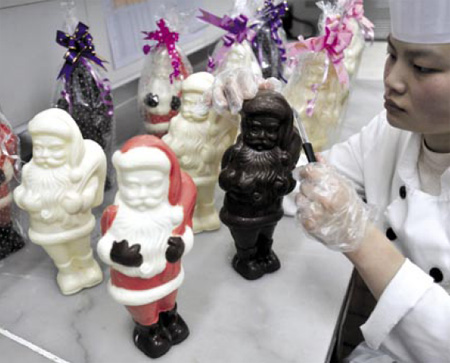Cover Story
Increases in Christmas orders bring little joy
By Meng Jing (China Daily)
Updated: 2010-09-17 10:56
 |
Large Medium Small |
|
A chef puts the finishing touches on a chocolate Santa in a hotel in Wuhan, Hubei province, Central China. Zhou Chao / for China Daily |
Higher wages, rising material prices cut deeply into profits of Chinese factories
SHENZHEN - Christmas orders are pouring in, but Hao Xiaopeng has no reason to celebrate. Instead, the owner of one of Shenzhen's largest Christmas tree makers says he faces an even tougher time this year.
In Hao's factory, 500 workers are busy making thousands of trees, filling 20 containers which leave the 60,000-square-meter factory for Shenzhen's largest port, Yantian, to be shipped to the United States and Europe, everyday.
Hao's company, King Tree Corp, sells 70 percent of its products to North America, with the rest to Europe.
King Tree snapped up $15 million in Christmas orders this year, double what it had last year.
But a freefall in profit margins, due partly to rising labor costs, is prompting the veteran businessman to think, for the first time, of winding up his 11-year business in China's manufacturing powerhouse, Guangdong province in the south.
"We are alive, but dying," he said. "We could still gain 15 percent profit last year, which was the worst economy I've ever seen.
"But this year, the margin has narrowed to 2 percent to 5 percent."
Hao said when he opened his factory in 1989, the margin was as high as 30 percent.
Yet, exports from Guangdong have recovered as the effects of the global financial crisis ebb.
The number of containers shipped from Shenzhen in August has jumped to 1.06 million in August, from 897,497 in August last year, Shenzhen Ports Association said.
Statistics from the General Administration of Customs also show an increase of overseas orders, with about $278 billion worth of goods exported from Guangdong from January to August this year, up by 28.6 percent year-on-year.
However, for the already low-profit labor-intensive factories, which make up two-thirds of manufacturers in the Pearl River Delta, the seemingly boom in sales is not a sign of an easy life.
Hao's woe, shared by many companies, was a fresh sign of the delta losing its status as a top global supplier of labor-intensive goods, with some analysts saying the region could in years give way to producers in Southeast Asia.
Hao said rising raw material prices are also to be blamed. "The prices of wires and plastics, the main material of Christmas trees, have increased by 20 percent this year, let alone the rising labor cost and the appreciation of the yuan," he said.
Hao, who once regarded the Christmas product industry as an eternal business, is now thinking about closing his factory for good.
"Otherwise, I will have to set a higher price for my products, up by 15 percent at least. My clients are not going to accept it," he said.
Hao is not the only one suffering. Liao Jiahua, from Shenzhen Hongyu Artcraft Factory, a Christmas decoration manufacturer, said the higher cost of workers is giving his company a tough time.
The Guangdong provincial government raised the minimum wage in May by 21.1 percent on average - the largest increase since China's opening-up drive began three decades ago.
In the material processing industry alone, 60 percent of the expenditure is labor related, making the 21 percent pay increase a bitter pill to swallow, media reports said.
"But if we don't raise wages, how can we keep our workers from running away?" Xu Xia, a human resources officer with Daqian Gift Co in Dongguan, Guangdong province, said.
The basic monthly salary in her company has increased from 1,000 yuan ($146) last year to 1,200 yuan this year, higher than the official minimum wage of 920 yuan in Dongguan.
"Still, people come and go very quickly," she said.
"We have lowered our recruitment standards. Anyone under 35 can work in our factory now. You know, we never hired those older than 30 before."
Six manufacturers in Shenzhen and Dongguan contacted by China Daily complained about the increase in labor costs and the shortage of workforce, saying salaries in the Pearl River Delta are no longer attractive.
Some of original equipment manufacturers (OEMs) have moved their factories inland, where labor and production costs are lower. However, some analysts said most factories cannot close up and move.
Ding Li, director of the competitive power center at the Guangdong Academy of Social Sciences, said two-thirds of the companies in Guangdong are export-oriented.
"The materials they process are from abroad and they need to ship the finished products out," he said, pointing out that extra transport costs of moving inland are not affordable for some factories.
